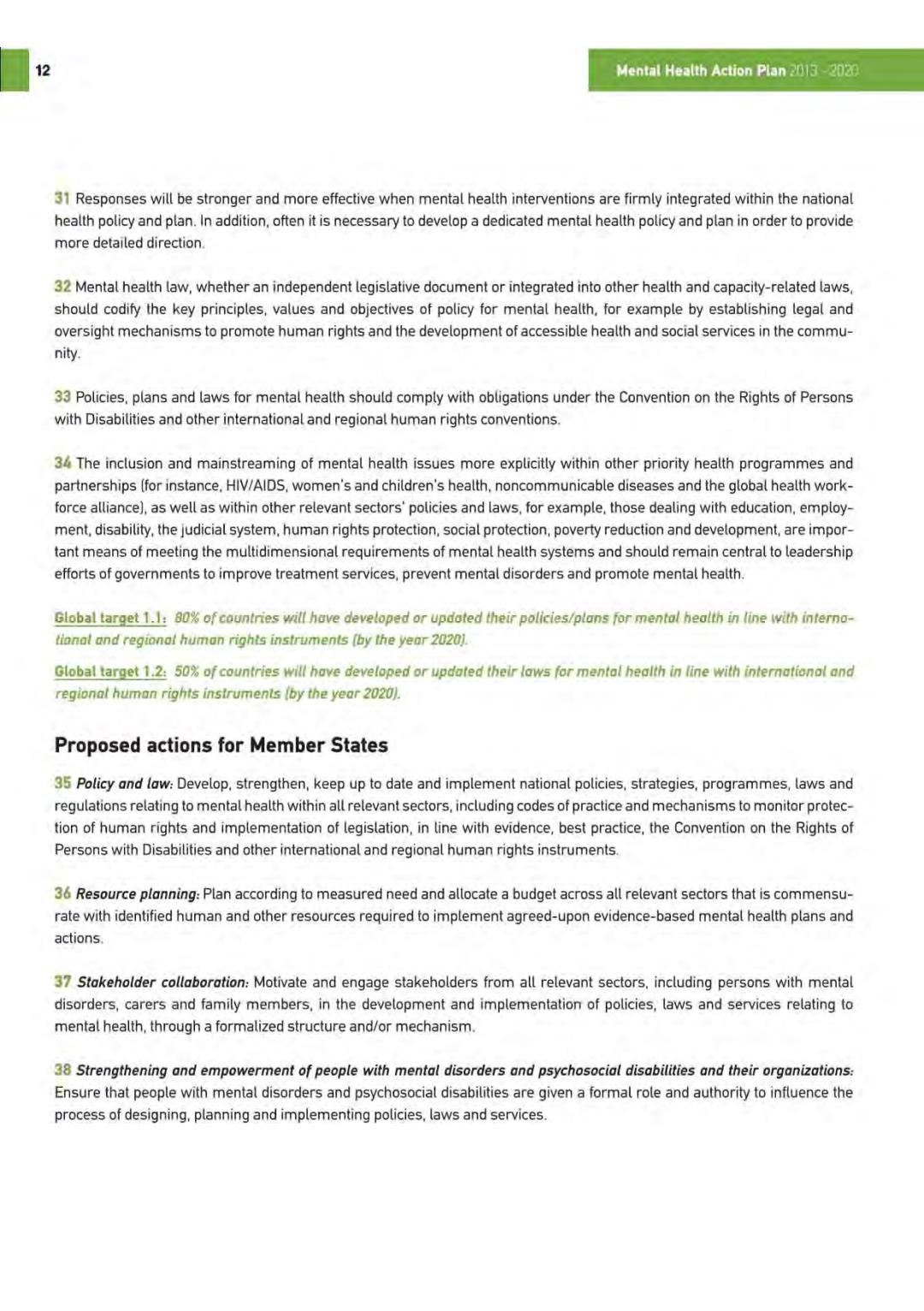正在加载图片...

12 Mental Health Action Plan 2013-2020 31 Responses will be stronger and more effective when mental health interventions are firmly integrated within the national health policy and plan.In addition,often it is necessary to develop a dedicated mental health policy and plan in order to provide more detailed direction. 32 Mental health law,whether an independent legislative document or integrated into other health and capacity-related laws. should codify the key principles,values and objectives of policy for mental health,for example by establishing legal and oversight mechanisms to promote human rights and the development of accessible health and social services in the commu- nity. 33 Policies.plans and laws for mental health should comply with obligations under the Convention on the Rights of Persons with Disabilities and other international and regional human rights conventions. 34 The inclusion and mainstreaming of mental health issues more explicitly within other priority health programmes and partnerships (for instance.HIV/AIDS,women's and children's health,noncommunicable diseases and the global health work- force alliance),as well as within other relevant sectors'policies and laws,for example.those dealing with education,employ- ment,disability,the judicial system,human rights protection,social protection,poverty reduction and development,are impor- tant means of meeting the multidimensional requirements of mental health systems and should remain central to leadership efforts of governments to improve treatment services,prevent mental disorders and promote mental health. Global target 1.1:80%of countries will have developed or updoted their policies/plans for mental health in line with interno- tional and regionol humon rights instruments (by the year 2020). Global target 1.2:50%of countries will have developed or updated their laws for mental health in line with internationol and regionat human rights instruments (by the year 2020). Proposed actions for Member States 35 Policy and law:Develop,strengthen,keep up to date and implement national policies,strategies,programmes,laws and regulations relating to mental health within all relevant sectors,including codes of practice and mechanisms to monitor protec- tion of human rights and implementation of legislation,in line with evidence,best practice,the Convention on the Rights of Persons with Disabilities and other international and regional human rights instruments. 36 Resource planning:Plan according to measured need and allocate a budget across all relevant sectors that is commensu- rate with identified human and other resources required to implement agreed-upon evidence-based mental health plans and actions. 37 Stakeholder collaboration:Motivate and engage stakeholders from all relevant sectors.including persons with mental disorders,carers and family members,in the development and implementation of policies,laws and services relating to mental health,through a formalized structure and/or mechanism. 38 Strengthening and empowerment of people with mental disorders and psychosocial disabilities and their organizations: Ensure that people with mental disorders and psychosocial disabilities are given a formal role and authority to influence the process of designing,planning and implementing policies,laws and services.12 Mental Health Action PLan )(11, 7~;', 31 Responses will be stronger and more effective when mental health interventions are firmly integrated within the national health policy and ptan. In addition, often it is necessary to develop a dedicated menial health policy and plan in order to provide more detailed direction. 32 Mental health taw, whether an independent legislative document or integrated into other health and capacity-related laws, shouLd codify the key principles, vaLues and objectives of policy for menial heaLth, for example by establishing Legal and oversight mechanisms to promote human rights and the development of accessible health and social services in the community. 33 PoLicies, plans and laws for menIal health should comply with obligations under the Convention on the Rights of Persons with Disabilities and other international and regional human rights conventions. 34 The inclusion and mainstreaming of mental health issues more explicitly within other priority health programmes and partnerships [for instance, HIVIAIDS, women's and children's health, noncommunicable diseases and the global health workforce alliance]. as well as within other relevant sectors' policies and laws, for example, those dealing with education, employment, disability, the judicial system, human rights protection, social protection, poverty reduction and development, are important means of meeting the multidimensional requirements of mental health systems and should remain central to leadership efforts of governments to improve treatment services, prevent menial disorders and promote mentaL heaLth. Global target 1.1: 80% of countries will have developed or updated their policies/plans for mental health in line with international and regional human rights instruments (by the year 2020). Global target 1.2: 50% of countries will hove developed or updated their laws for mental health in line with international and regional human rights instruments (by the year 2020). Proposed actions for Member States 35 Policy and law: Develop, strengthen, keep up to date and implement national policies, strategies, programmes, laws and reguLations reLating to mental heaLth within aLI relevant sectors, including codes of practice and mechanisms to monitor protection of human rights and implementation of legislation, in line with evidence, best practice, the Convention on the Rights of Persons with Disabilities and other international and regional human rights instruments. 36 Resource planning: Plan according to measured need and allocate a budget across all relevant sectors that is commensurate with identified human and other resources required to implement agreed-upon evidence-based mental health plans and actions. 37 Stakeholder collaboration: Motivate and engage stakeholders from all relevant sectors, including persons with mental disorders, carers and family members, in the development and implementation of policies, laws and services relating to mental health, through a formalized structure and/or mechanism. 38 Strengthening and empowerment of people with mental disorders and psychosocial disabilities and their organizations: Ensure that people with mental disorders and psychosocial disabilities are given a formal role and authority to influence the process of designing, planning and implementing policies, laws and services